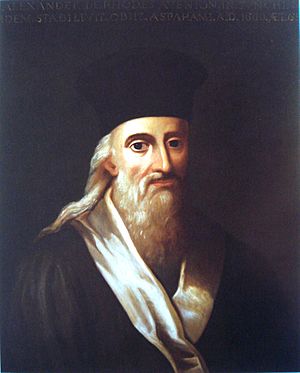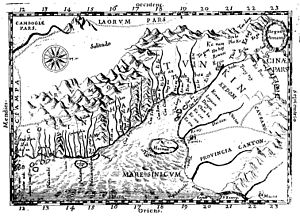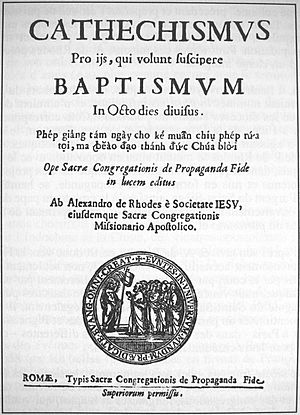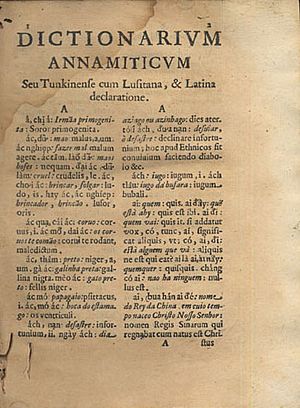Alexandre de Rhodes facts for kids
Quick facts for kids Alexandre de Rhodes |
|
|---|---|
 |
|
| Personal details | |
| Born | 15 March 1593 Avignon, Papal States |
| Died | 5 November 1660 (aged 67) Isfahan, Persia |
| Denomination | Roman Catholicism |
Alexandre de Rhodes (born March 15, 1593 – died November 5, 1660) was a French Jesuit missionary. He was also a lexicographer, which means he created dictionaries. He made a big difference for Christianity in Vietnam.
He wrote the Dictionarium Annamiticum Lusitanum et Latinum. This was the first dictionary that translated between Vietnamese, Portuguese, and Latin. It was published in Rome in 1651.
About Alexandre de Rhodes
Alexandre de Rhodes was born in Avignon, which was part of the Papal States at the time. Today, Avignon is in France. When he was 19, he joined the Society of Jesus, also known as the Jesuits. He wanted to dedicate his life to missionary work.
In 1624, he traveled to East Asia. He arrived in a part of Vietnam called Đàng Trong (Cochinchina). There, he learned Vietnamese from another Jesuit, Francisco de Pina.
Missions in Vietnam
In 1627, Alexandre de Rhodes went to Đàng Ngoài (Tonkin), which is North Vietnam. He landed there on March 19, 1627. He then traveled to the capital city, Thăng Long, which is now Hanoi.
He worked in this area until 1630. During these three years, he was often near the court of the local ruler, Lord Trịnh Tráng. He wrote a popular Catholic prayer book in Vietnamese called Ngắm Mùa Chay. This book helps people think about the suffering of Jesus.
In 1630, he was forced to leave Vietnam. Lord Trịnh Tráng worried that de Rhodes might be a spy. De Rhodes said he helped convert over 6,000 Vietnamese people during this time. He once wrote that daily conversation in Vietnam "resembles the singing of birds."
After leaving, de Rhodes spent ten years in Macau. Then he returned to Vietnam, this time to Đàng Trong (the south). He stayed there for six years. However, he upset Lord Nguyễn Phúc Lan and was sentenced to death.
Later Life and Legacy
His death sentence was changed to exile. So, de Rhodes returned to Rome by 1649. He asked for more money to support Catholic missions in Vietnam. He told stories about the natural riches of Vietnam to encourage support.
His efforts helped create the Paris Foreign Missions Society in 1659. Since neither the Portuguese nor the Pope seemed very interested in sending him back to Vietnam, de Rhodes found two volunteers in Paris. They were François Pallu and Pierre Lambert de la Motte. They became the first members of the Paris Foreign Missions Society and were sent to Asia.
Alexandre de Rhodes himself was sent to Persia instead of Vietnam. He died in Isfahan, Persia, in 1660. He was buried in the New Julfa Armenian Cemetery.
In 1943, the French colony of Indochina honored him with a 30-cent postage stamp. In 2001, a Vietnamese artist named Nguyen Dinh Dang created a painting to honor Alexandre de Rhodes.
His Works
While in Vietnam, de Rhodes helped create an early Vietnamese alphabet. He built on the work of earlier Portuguese missionaries. He put together a catechism (a book of religious teachings) and his famous trilingual dictionary. Both were published in Rome in 1651.
De Rhodes preferred this new alphabet, which used Latin letters, over the older Nôm script. This new alphabet was later improved and became chữ Quốc ngữ. It became the main written form of the Vietnamese language in the 20th century.
De Rhodes also wrote several books about Vietnam and his travels:
- Relazione de’ felici successi della santa fede predicata dai Padri della Compagnia di Giesu nel regno di Tunchino (Rome, 1650)
- Tunchinesis historiae libri duo (Lyon, 1652)
- Histoire du Royaume de Tunquin (Lyon, 1651), a French translation
- Divers voyages et missions du P. Alexandre de Rhodes en la Chine et autres royaumes de l'Orient (Paris, 1653)
- La glorieuse mort d'André, Catéchiste (The Glorious Death of Andrew, Catechist) (published 1653)
See also
 In Spanish: Alexandre de Rhodes para niños
In Spanish: Alexandre de Rhodes para niños
 | Kyle Baker |
 | Joseph Yoakum |
 | Laura Wheeler Waring |
 | Henry Ossawa Tanner |




